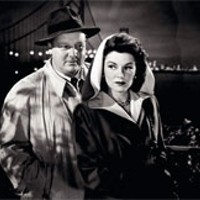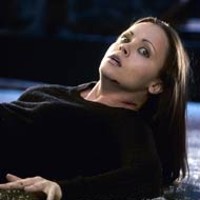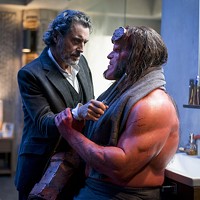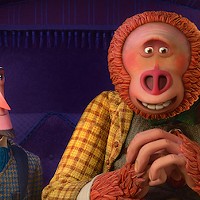





 1/2
1/2
THE FOG OF WAR (2003). Subtitled Eleven Lessons From the Life of Robert S. McNamara, The Fog of War might reasonably be expected to serve as a mea culpa on the part of the former Secretary of Defense for both the Kennedy and Johnson administrations, a plea for forgiveness for his role as one of the chief architects of the Vietnam War. Yet this important work from Errol Morris (The Thin Blue Line), an Academy Award winner for Best Documentary Feature, proves to be an infinitely more comprehensive -- not to mention more ambiguous -- piece of nonfiction, as McNamara discusses just about every facet of his life yet still remains tantalizingly opaque regarding certain subjects. Punctuated by vintage newsreel footage as well as Morris' blatant attempts to visually dress up what's largely a "talking head" movie, McNamara chats about his experiences during World War II (where he was involved with the firebombing of Japan), his stint as president of Ford, and the Cuban Missile Crisis before inexorably circling back to the topic of Vietnam. The Fog of War does indeed offer many lessons to mull over, yet the most meaningful one might be the old axiom about history repeating itself: One look at the current mess in Iraq and it's chilling to note how little has been learned by those in charge. DVD extras include two dozen additional scenes (totaling 38 minutes) and the theatrical trailer.
Movie: 


Extras: 

MIRACLE (2003). This Disney release, a modest box office hit this past spring, was promoted as "From The Studio That Brought You The Rookie And Remember The Titans," and that was clearly the best way to market this film. Like those sports-illustrated endeavors, this one's also an acceptably middlebrow drama that asks nothing more of its viewers than to cheer at the appropriate moments and get a "Wave" going in the living room during the climactic Big Game. Here, the focus is on coach Herb Brooks (Kurt Russell) and the 20 kids who formed the US Ice Hockey team that somehow managed to beat the formidable Russian squad during the 1980 Olympics. Although reasonably involving, there's nothing about the movie's "underdog" angle that feels remotely fresh; instead, what's more interesting to ponder is the film's not-so-subtle suggestion that, coming at the end of a turbulent decade (Watergate, Vietnam, the hostage crisis, gasoline shortages), it was this single event and not (as widely credited) Ronald Reagan's ascendancy that inspired and rejuvenated a reeling nation. By that token, which sporting event will eventually lead us out of the escalating injustices commonplace in George W. Bush's United Police State of America? (The smart money's on Game 7 of the 2009 World Series.) Extras on the two-disc DVD include audio commentary by director Gavin O'Connor, a making-of short, interviews with the late Herb Brooks and three team members, and outtakes.
Movie: 
 1/2
1/2
Extras: 


THE TESTAMENT OF DR. MABUSE (1933). They may not be as famous as his full-fledged masterpieces Metropolis and M, but Fritz Lang's movies featuring criminal mastermind Dr. Mabuse made that character (created by author Norbert Jacques) as famous to German audiences of the day as Hannibal Lecter is to modern American viewers. Lang first introduced the megalomaniacal villain to the screen in the 1922 silent feature Dr. Mabuse: The Gambler, returned to him in 1933 for The Testament of Dr. Mabuse, and retired from cinema altogether after helming 1960's The 1,000 Eyes of Dr. Mabuse. Testament is the most notorious of the three, simply because it was the film that helped trigger Lang's flight from Nazi Germany. Joseph Goebbels, Adolph Hitler's Minister of Propaganda, banned the film before it was even released, spurring Lang to flee to Paris before eventually settling into a lengthy career in Hollywood. Rudolf Klein-Rogge reprised his role as Mabuse, seen here as an inmate at an insane asylum yet still able to rule over a vast criminal empire that threatens to leave Berlin in ruins. Taking a supernatural twist, this stylish film even allows the madman's spirit to possess the asylum head (Oskar Beregi), and it's up to rumpled Inspector Lohmann (Otto Wernicke, essaying the same role he played in M) to crack the case. Extras on the two-disc DVD include perceptive audio commentary by Mabuse scholar David Kalat, a fascinating comparison of the German, French and American cuts of the film, and a 1964 interview with Lang.
Movie: 


Extras: 

 1/2
1/2





